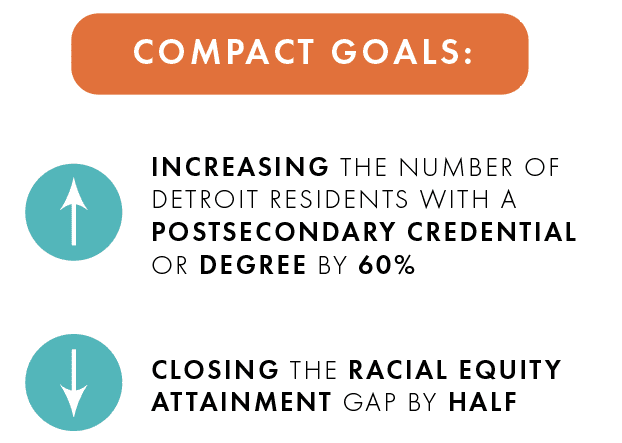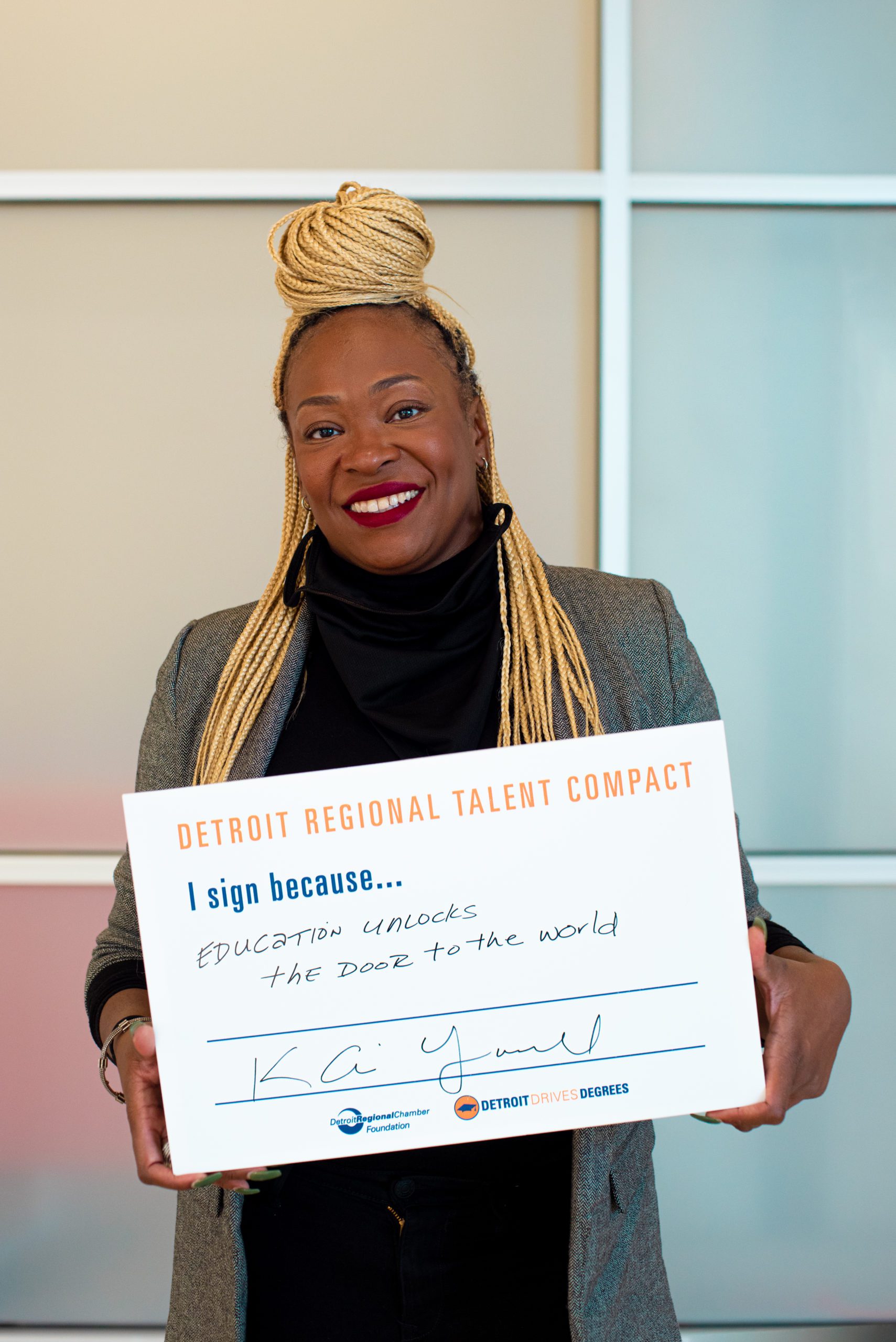Creating a Roadmap: Unprecedented Detroit Regional Talent Compact Empowers Learners to Boost the Talent Pipeline
January 5, 2021Leveraging the strength of numbers, a broad coalition of leaders have united to tackle a problem that’s hamstrung the Detroit Region for generations. Too few Detroiters receive education beyond high school. This leaves a void in the talent pipeline, dragging down per capita income, economic development, and entrepreneurship.
 Under the leadership of the Detroit Regional Chamber, nearly 40 partners in government, business, education and philanthropy signed the Detroit Regional Talent Compact, a 10-year roadmap which is committed to making Southeast Michigan’s workforce better educated, more nimble and more diverse. Fewer than half of Detroit’s residents hold a postsecondary degree or credential, but 88% of jobs that offer a sustaining wage require education beyond high school. The economic impact of COVID-19 underscores the Talent Compact’s mission to achieve those education attainment goals, to weather future economic storms.
Under the leadership of the Detroit Regional Chamber, nearly 40 partners in government, business, education and philanthropy signed the Detroit Regional Talent Compact, a 10-year roadmap which is committed to making Southeast Michigan’s workforce better educated, more nimble and more diverse. Fewer than half of Detroit’s residents hold a postsecondary degree or credential, but 88% of jobs that offer a sustaining wage require education beyond high school. The economic impact of COVID-19 underscores the Talent Compact’s mission to achieve those education attainment goals, to weather future economic storms.
This unprecedented group is committed to breaking down barriers to postsecondary schooling with these two goals in mind: increase the number of Detroiters with a postsecondary credential or degree by 60% and reduce the racial equity gap by half by 2030. To do this, more than 90,000 Black and 15,000 Latinx students need to earn degrees in the next decade.

“As a region, if we increase the percentage of our population with some kind of a credential, we increase our per capita income, which is arguably one of the most important indicators of economic prosperity,” said Greg Handel, vice president of education and talent for the Detroit Regional Chamber. “For every one-percentage point increase in the number of people with a bachelor’s degree, the per capita income goes up by about $1,250.”
Gov. Gretchen Whitmer adopted the 60% by 2030 goal as a statewide initiative, too, validating the Talent Compact’s vision.
 Laying the Compact’s Foundation
Laying the Compact’s Foundation
The Compact grew out of a foundation created by the Detroit Drives Degrees Leadership Council, which is overseen by Melanie D’Evelyn, director of education and talent initiatives for the Chamber. It is co-chaired by Oakland University President Ora Hirsch Pescovitz and Richard Rassel, chairman of Butzel Long.
In 2017, a micro group of stakeholders began this conversation and then studied the talent compacts from other cities, including Los Angeles, Chicago and Cleveland. They identified 17 strategies to achieve its goals. After several surveys, focus groups and a master plan, each signatory of the compact announced their organization’s pledge as to how they will commit to the cause. Each was required to target one of the four major focus areas: increasing postsecondary access, postsecondary success, adult educational attainment and talent preparation.

“We really need stakeholders across the community to help stem the tide,” D’Evelyn said.
Wayne State University answered the call by creating a debt forgiveness program to reach those who started college but left for financial or personal reasons. DTE Energy encourages its current workers to return to school, offering tuition assistance. Emagine Entertainment, which typically has a young workforce, ensured employees learn about filling out federal financial aid applications for college programs.
And the partners have a way to fund these programs. “What’s unique is we are meeting regularly with heads of foundations and trying to get them to not only work together, but also think about how they align their giving strategies to the priorities of the compact,” D’Evelyn said.
Because no one institution can solve the problem; they are solving it together. •
Rene Wisely is a freelance writer in Metro Detroit.
Innovative Program Reaches Stop-Outs
Oakland University (OU) turned to data to inspire a creative solution for its public pledge for the Detroit Regional Chamber’s Talent Compact.

Dawn Aubry, vice president of Enrollment Management for the university, combed its files between 2013 and 2017 to discover how many students started college but never graduated. She calls such students stop-outs rather than dropouts because they stopped attending OU because they may have run out of money, had a demanding job or a life event got in the way. The data showed 5,570 stop-outs who earned OU credits and never attended or graduated from another school.
Aubry created the Golden Grizzlies Graduate Program in response. It offers micro grants to pay for classes and a team of undergraduate experts who advocate for the student. Credit evaluation staff facilitate real-world experience to count as a class substitute, financial aid gurus find more funding and even childcare, if that’s a roadblock to graduation.
OU rolled out the program in the fall of 2019.
“We have had tremendous success with this program after only a year,” Aubry says. They have 237 students using the program and some have already graduated.
“We want to see them graduate and lead productive lives,” Aubry says.
Building a Bridge to School Success
Building bridges isn’t on Jack Elsey’s resume, but it should be now. The executive director of the Detroit Children’s Fund played a key role in bringing four Detroit charter school management companies together. Normally competitors, the Detroit Charter High School Collaborative united to create a plan as its contribution to the Detroit Regional Talent Compact to have 90% of their students complete at least one year of college, a move that will eventually usher prepared students into the workforce pipeline.
Each charter school has an interest in ensuring that all students have access to post-secondary coursework while they are in high school. This will have a domino effect, Elsey said. “That will dramatically increase the numbers of students that can access to Detroit College Promise,” since many were unable to meeting the minimum GPA requirements.
The charter schools participating are: New Paradigm for Education, Equity Education, Promise School and University Prep Schools.
“We deeply believe that the economic future of our city depends on the quality of education that every one of our students is getting,” Elsey said. “But we also believe that every one of our students deserves a high-quality education. And currently, all of the data says we fall far short of living up to their promises as a city.”
The Detroit Children’s Fund, a philanthropic nonprofit that invests in programs and people to improve schools, is economically supporting this venture, which is a key component to the success of the Talent Compact.
“This really starts a new era for the city of Detroit,” Elsey said.
Rene Wisely is a freelance writer in Metro Detroit.
